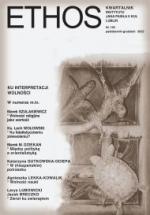 zobacz powiększenie | DOI 10.12887/35-2022-4-140-10 Katarzyna GUTKOWSKA-OCIEPA, In a (Spanish) Trap: Freedom in the Narrative Prose of Alejandro Cuevas Cena brutto: 7,00 PLN za szt. |
|
The article describes the theme of freedom as it is developed in two recent works by Alejandro Cuevas, a Spanish writer born in Valadolid in 1973. The works in question are a novella Mariluz y el largo etcétera of 2018 and a novel Mi corazón visto desde el espacio of 2019. The text is divided into three parts. In the introductory one, the concept of freedom is described in the context of ratiovitalism and the idea of circumstance as developed by José Ortega y Gasset (“I am I and my circumstance; and, if I do not save it, I do not save myself.”). Cuevas’s literary strategy is interpreted by reference to Samuel Beckett’s play Eleutheria of 1947, where freedom appears a passive and aboulic condition. The central part of the paper is focused on the interpretation of the motif of freedom in Cuevas’s works, specifically exploring the needs of their main protagonists (a 32-year old male “I” and a 36-year old female called Mariluz who has a doctorate but is incapable of finding a job matching her skills and thus of providing for herself) as juxtaposed with the pre-existing “circumstance” of their lives. The analysis of the motif in question is conducted with a view to Milton Friedman’s concept of the of the dependence of individual freedom on the way the political and economic community is governed. Thus the paper also scrutinizes how the workings of various types of freedom in the toxic local communities in the plutocratic Spain are reflected in Cuevas’s fiction, pointing to the instability of the Spanish job market and in particular to the precarious professional circumstance of the well-educated X generation, whose members not infrequently majored in the humanities, including language and literary studies. Cuevas shows the acute disillusionment of those who have decided to dedicate their lives to art and culture. In the concluding part of the paper the process of problem solution on the part of Cuevas’s protagonists is reconstructed in terms of an “exercise in freedom,” which consists in expanding their intellectual universe so that, despite the oppressiveness of the outside world, they are capable of choosing the shape of their own freedom, adopting, in a way, the attitude of Victor from Beckett’s Eleutheria. Keywords: Alejandro Cuevas, freedom, stress, Samuel Beckett, José Ortega y Gasset, money, precarious employment Contact: Instytut Literaturoznawstwa, Wydział Humanistyczny, Uniwersytet Śląski, ul. Grota-Roweckiego 5, 41-205 Sosnowiec, Poland Pliki do pobrania: » Gutkowska_Ociepa.pdf | |
